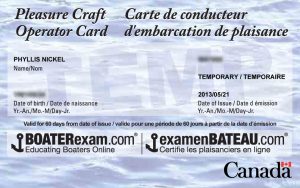Canada: Certificate of Competency Now Required by Every Boater
Phyllis Nickel, of SV Morgan’s Cloud, reports on her experience of obtaining the Canadian government’s required Certificate of Competency.
Published 11 years ago, updated 6 years ago


Due to pressure building on all sides (Canada, Norway, etc.), I finally caved, took a Boating Safety Course, passed the exam, and am now the proud bearer of a Pleasure Craft Operator Card (Canada).
It isn’t that I think a boating safety course is a bad idea, it’s just that our peripatetic lifestyle doesn’t lend itself to a classroom situation. And—okay I’ll admit it—I just never got around to it.
However, it is now required in Canada that anyone operating a motorized vessel of 10HP or more must have an operator card, with noncompliance subject to a hefty fine. And Norway is also on the bandwagon with a certificate of competency requirements (see the Norwegian Cruising Guide for more). Added to that, Transport Canada has now licenced several sites (Boaterexam is the one I used) to offer the course and exam online (Boaterexam also has a US site). So I couldn’t put it off any longer.
And, I have to admit, the online course and exam worked brilliantly. I paid my $45.00Cdn, I set up a profile, and then I could come and go as I wished. In the course, I took there were 5 modules, each with numerous sections. Each section had a minimum amount of study time required (there was a countdown) and I had to put in at least 3 hours of online studying in total. There were quizzes at the end of each module.
When I completed all 5 modules and passed all the quizzes, I got scooted over to Transport Canada where I completed the 50 question multiple choice exam, which was open book. Once I completed that, I was scooted back to Boaterexam where I printed out a temporary card while I wait for my permanent card. And the card is good for life. Yeah!
What do I think of the course content? Well, that is a slightly different story! I do recognize that Transport Canada is offering this course for every kind of boat from a 6 m sailboat to a 24m long motorboat, from those sailing on lakes to those of us who sail offshore, so that means a lot of the information isn’t relevant to what we do. And, of course, typical for a bureaucracy, the amount of time spent on the equipment required far outweighed the amount of time spent on rules of the road, navigation lights, and basic seamanship concepts. But, after seeing some of the incredibly stupid things people do on the water (the Chesapeake Bay comes to mind where we were repeatedly almost T-boned by turbo-charged, fishing-crazed, motorboaters with no concept of the rules of the road), I’m all for this kind of basic training.
And, since most jurisdictions with such requirements will accept the certification required by the mariner’s home country, I should now be good to go wherever we may roam. So look out you Chesapeake Bay yahoos—next time you try racing across our bow when approaching from the port side, I’ll wave my Pleasure Craft Operator Card at you!
Phyllis Nickel
SV Morgan’s Cloud
Article from Phyllis Nickel and John Harries’ website http://www.morganscloud.com
Related to following destinations: Canada






